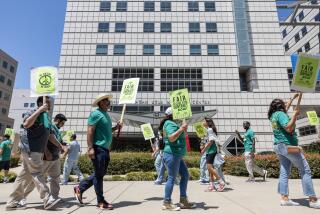Volunteers at Medical Center Help Aid the Poor
- Share via
Among the monthly expenses of the multimillion-dollar budget at the UC San Diego Medical Center are $400 in city bus tokens.
If they did not receive the tokens, numerous economically strapped patients would not return to the hospital for required follow-up care, perhaps leading to a recurrence or worsening of their illnesses and ultimately costing the medical system hundreds or thousands of extra dollars.
The tokens represent the largest single expense each month from the Patient Emergency Fund (PET), a charitable pool of money used for meeting the emergency expenses of the low-income people who use the region’s largest academic medical facility.
Those emergencies can range from bus transportation to meal vouchers to gas to medicine, according to the hospital’s director of social work.
“People forget that there are a lot of little homey things that go on here in the midst of all the high-technology medicine provided,” Frank Kastelic said. “For example, many times a trauma victim will come in, having had all his or her clothes blown off. We have sets of clothing of various sizes we can provide if necessary so that the patient doesn’t have to leave in a hospital gown and paper slippers.”
These “little things” are covered by funding and donations from the UCSD Medical Center Auxiliary, a group of about 380 volunteers who operate the hospital’s gift shop and thrift store as well as sponsor special events such as an upcoming benefit dinner with Sir Edmund Hillary, the first man to climb Mt. Everest and live.
The auxiliary turns over about $1,000 each month to Kastelic’s department, Penny West, auxiliary president, said. In 1984, it donated $14,400 to PET, from which 9,805 requests for help were met.
“I hope it is clear that this is not tax money,” West said, mindful of criticism from some people that public dollars should not go toward patient bus or taxi fares, or helping relatives reunite with terminally ill patients. “The patients know where the money comes from because they receive a card (in English and Spanish) with a simple explanation of PET.”
But while the card asks recipients to try to repay at least some of the aid, West concedes that the auxiliary expects little in reimbursements.
“Quite frankly, these people are not in the category of those who can donate,” West said.
Kastelic said the money is for those people “who fall through the cracks” of the social system. “Most people have some sort of connection (to get them through),” he said, “either a friend or family member who can help out.”
But then there are people such as the 65-year-old destitute man who was suffering from a terminal disease when he entered the hospital last year. Doctors stabilized his condition but realized he had perhaps a month or less to live. Nevertheless, such a patient would normally be discharged, probably to local relatives, because acute care would no longer be required.
In this case, the man had no family in the area. A hospital social worker, one of 19 who serve as the eyes and ears for the emergency fund, felt that discharge to a single room at a low-income hotel would be inappropriate.
The social worker was able to find some of the man’s children living in Seattle, Kastelic said. And while they wanted to have their father live out his last days with them--not having seen him in more than 15 years--they could not afford his air fare.
So PET bought him a ticket to Seattle, Kastelic said.
Frequently, out-of-state patients are referred to the medical center because of UCSD’s worldwide reputation for excellence, but relatives bringing them are unable to afford the high cost of meals and lodging in San Diego during their wait. Kastelic provides a list of low-cost motels and apartments--”safe and clean”--as well as making available meal vouchers for the hospital’s cafeteria.
Social workers found temporary lodging for a family of four after the father was suddenly discharged from the military, leaving them homeless at the same time their youngest child developed kidney problems.
Kastelic said the PET program functions as a bridge, to tide destitute or temporarily down-and-out patients over until other social aid programs can take up the slack. He admits that the more permanent programs are not always available, especially with social service cutbacks during the last few years because of tightened government budgets.
While PET is the hospital’s primary means for covering emergencies of the poor, Kastelic said that individual nurses and doctors at the hospital also help out patients on their own from time to time.
“People get touched,” Kastelic said. “It’s a natural thing.”
More to Read
Sign up for Essential California
The most important California stories and recommendations in your inbox every morning.
You may occasionally receive promotional content from the Los Angeles Times.













